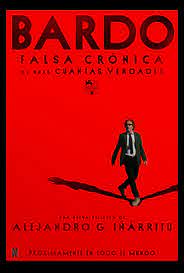
BARDO - FALSE CHRONICLE OF A HANDFUL OF TRUTHS
Mexico, 2022, 169 minutes, Colour.
Daniel Gimenez Cacho, Griselda Siciliani, Ximene Lamadrid, Iker Solano, Francesco Rubio.
Directed by Alejandro G. Inarritu.
Many a writer, many a director, will explain their film as autobiographical, that they have incorporated their life, often their early life, into the screen fiction. Sometimes, these directors are more explicit, like Ingmar Bergman. However, probably the best-known is Federico Fellini with his creative imaginary and imaginative self-exploration, 8 ½.
Alejandro G.Inarritu was a prominent Mexican director (Amores Perros) more than 20 years ago. He then moved to the United States, a number of striking and popular films, 21 Grams, Babel, Biutiful, and then winning an Oscar for Birdman, followed by The Revenant.
Now, in his late 50s, he has decided to return to Mexico and film there, often with quite striking locations, from Mexican cities and streets, to many scenes in the desert, and sequences with a vast number of migrants making their way by car and on foot to the American border. But, there are also scenes in comfortable Los Angeles where he has settled, his two children, teenagers, very American in accent and interests. He has the continued support of his devoted wife.
But, the director has decided to make a film which will appeal to an arthouse, specialist audience, rather than a popular audience. It is fair to say that a popular audience would soon be bewildered by what they see, in their attempts to follow some kind of linear progress of the narrative, in the speeches, in the dreams, in the fantasies. (A critic of the director’s documentary, which is screened before a sequence where he receives an award, but prefers to leave the ceremony, remarks that the film would have been better at 90 minutes – and, perhaps, an audience is aware as they watch that this film that it is 11 minutes under twice that length!).
Arthouse audiences who appreciate this kind of visual imagination, thematic explorations of the meaning of life, on journalism and documentary creativity, will not be so concerned about length and mystery. In fact, many have hurried to use the word masterpiece.
It is intriguing to watch the performance by Daniel Ximenes Cacho as Silverio, the director’s alter ego. At first, we see him as an unkempt stranger, a short man, his relationship with his wife and her pregnancy (and his and his doctor’s wanting her to have the child return to the womb, an early striking sequence), but, as the film continues, a man of lively contrasts, happy to dance, happy to retreat in silence, sometimes extrovert but basically introverted. And, as we watch, scenes which might puzzle as, we realise that they are reconstructions of sequences from his documentary, the 19th century war between America and Mexico and the annexations, money paid, extorted; then towards the end, a dark sequence of a mountain of poor people, interrupted by the director and we see that it is a scene from his documentary.
This is a film which invites us to surrender to its central character, to the style and treatment, to the contemporary themes of Latin Americans in the US (and anger, towards the end, treatment by passport control), to journalism and creative filmmaking, to a range of images that we may not be able to catalogue but where we are invited to make imaginative interpretations and connections.
- The career of the director, a claim, Oscars…? His work in Mexico? Leaving? Success in the US? The return to Mexico for this cinematic reflection?
- The title, the Buddhist situation between death and rebirth? The narrative of the film as the directors Bardo? The subtitle, the emphasis on truths and falsity, some truth?
- The film as a cinema poem? The basic linear narrative plot, the director, in the US, family, Americanised children, the support of his wife, going to Mexico for the award, the celebration, the critique by his friend, Lewis, his not wanting to be at the award, his having to return to the US, is feeling humiliated at passport control in Los Angeles, returning home with his family?
- The blend of the real, the surreal, the dreams, the imagination? The fact of his documentary making, the visuals of the scenes, with the American Amb, yet the recreation of the war between Mexico and America and its consequences? The reality of the migrants coming from Latin America to the US, the vast sequences, the many migrants, men women and children, poor, the steady stream of cars, the people on foot? The surreal episode of his walking through the town, alone, coming to the square, the pile of bodies, his climbing? And the revelation that he was directing the scene?
- The impact of such imagination as the birth of the child, and its being put back in the womb? The later reflections on this child? His meeting with his father in the toilets, their discussions, memories of the past and his father talking, his being reduced child size though with his adult head?
- But the reality of the awards, discussions with his wife and son, preparation for the award, his daughter arriving, the many guests, going to meet his extended family, the reactions?
- Silverio himself, a short man, introverted, forced to extrovert, his ambitions with his documentary and showing it to the crowd (and the criticism that it should have been 90 minutes or is this film was originally over three hours, now 169 minutes)? His cheerfulness with dancing? Some intimate relation scenes of relationship with his wife? Her support of him?
- The opening with the desert sequences and the shadow on the land, returning to the desert and the same atmosphere and shadow? The framework for what had gone before, in terms of the director dramatising his life, the director dreaming and fantasising, trying to probe some of the truths and falsehoods of his life?